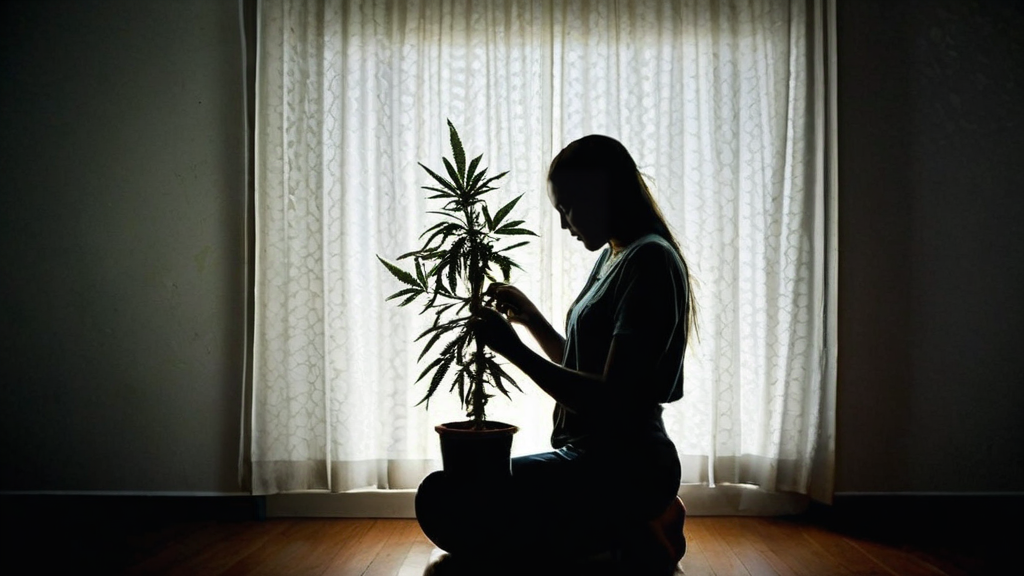The women who call themselves ‘nuns’ and believe in the medicinal power of the plant
On a full moon night, near a Mexican town, a group of women in nun’s habits gather around a bonfire, purify themselves with burning sage, and thank the moon, animals, and plants. Then they take a drag on a marijuana cigarette and blow the smoke into the flames.
Although they dress like religious women, the women do not profess any faith. They are part of an international collective that was born in 2014 called Sisters of the Valley, which is dedicated to spreading the ‘gospel’ of the healing properties of cannabis.
In the United States, where nearly twenty states have legalized the recreational use of marijuana, the group has also created a successful small business, which sells CBD tinctures, oils and ointments online, and which earned more than $500,000 per year. last year.
An image of rebellion in a country plagued by the war on drugs and Catholicism
But in Mexico, where a drug war has devastated the country and Catholicism is deeply rooted in the culture, the image of a nun smoking marijuana is more of a gesture of defiance, the women say.
The sisters are very active on social networks, especially on Instagram, where they can be seen caring for cannabis plantations, giving workshops and attending events related to the topic.
Their product sales are a fraction of those of their American counterparts: about $10,000 a year.
Although they are well-known online, the women (five in total) are cautious about revealing too much about where they operate. They do business out of a fake two-story concrete store with a finished room.
Since cannabis is in a legal gray area in Mexico and much of its production is still linked to criminal groups, they fear that the police or local gangsters may arrive to threaten or extort them.
On a recent weekend, when Reuters visited the site, the curtains remained closed. Packages of marijuana were dried in secret hiding places, hanging from a hidden clothesline or stored in the oven.
The inspiration of a medieval secular movement and the objective of recovering the plant from drug traffickers
The Sisters are inspired by a secular religious movement, the Beguines, which dates back to the Middle Ages. The group, made up of single women, was dedicated to spirituality, scholarship, and charity, but did not take formal vows.
Sisters around the world say they wear habits to project uniformity and respect for the plant, but they also know it attracts media attention.
Under the direction of Alehli Paz, a chemist and cannabis researcher who works with the group, the Sisters in Mexico grow a modest crop.
They put potted plants in old paint buckets and arrange them in rows between four concrete walls and an unfinished ceiling.
Once grown, the Sisters move the plants to private fenced gardens that they identified with the help of supportive older women in the community.
Their participation is limited to the weekends they can steal from their lives. Fueled by a seemingly endless stream of cigarettes and filled pipes, the women spend time on the farm pruning plants, producing cannabinoid salves, or weighing and storing different strains, labeled and dated, in old glass coffee jars.
They also visit others in Mexico City pushing for full legalization in the growing cannabis community, or teach workshops that address everything from how to make marijuana infusions to the chemistry behind the plant.
Commercial potential aside, they argue that the fight against drugs in Latin America has been a failure, leading to widespread violence and mass incarceration.
A challenge to the family and society in a conservative and Catholic country
But in a conservative country with a Catholic majority of about 75%, joining the Sisters has created tension in almost all of the women’s families.
Its founder in Mexico, who goes by “Sister Camilla” online and who declined to give her name, grew up in an evangelical home and left it at age 16 due, in part, to her mother’s strict religious code. said. When she founded Hermanas del Valle México, the relationship became even more strained.
“It was difficult for her to accept,” he said. “She had certain ideas that were very, very shaped by religion.”
But today, after long discussions about the plant and the legalization movement, his mother is essential to the group’s operations, helping to maintain the farm and offering other logistical support, he said.
For another “nun” who works as a church secretary, who goes by the nickname “Sister Kika” and also asked that her name not be revealed, the mission is clear. “It’s time to put an end to this stupidity,” she said.
Reuters
